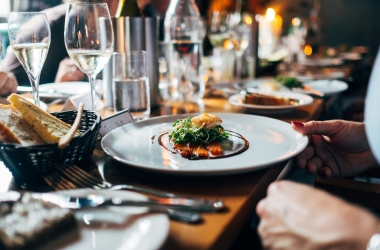Wittenborg Researcher Co-Authors Study on Sustainability in Independent Restaurants
Wittenborg Researcher Co-Authors Study on Sustainability in Independent Restaurants
Wittenborg Researcher Co-Authors Study on Sustainability in Independent Restaurants
Adam Jones Develops Toolkit to Empower Small Businesses with Practical Strategies
As sustainability becomes a growing priority for businesses worldwide, a new study led by Wittenborg associate professor Adam Jones offers practical guidance to help independent restaurants transition toward more environmentally responsible operations. The research, published in the open-access journal ‘Tourism and Hospitality’, proposes a sustainability toolkit informed by the experiences of small restaurant owners and managers in Brighton and Hove, UK.
Titled ‘Creating a Sustainability Toolkit for Restaurants’, the study was co-authored by Jones alongside the University of Brighton’s Timothy Laing, Francisca Farache and Julian Riano, and Ivanka Majic from Restaurants Brighton. Together, the team applied the Motivation-Opportunity-Ability (MOA) framework to examine how restaurants can be supported in implementing sustainability strategies that align with the United Nations Sustainable Development Goals, particularly SDG 12: Responsible Consumption and Production.
“Sustainability is not just a buzzword, it’s a necessity. But for many small restaurants, especially independent ones, the path to sustainability can be unclear and often daunting. Our goal was to understand the real challenges they face and identify concrete ways they can be supported,” Jones said.
Understanding the challenges
The research was carried out through two in-depth focus groups comprising eight restaurant owners and managers. The first group involved businesses already engaging in sustainability efforts, while the second featured restaurants still in the early stages of adopting such practices. This two-step methodology allowed the researchers to extract real-world motivations, barriers and enabling factors from both perspectives.
A key takeaway from the study was that restaurant sustainability is typically framed through a narrow environmental lens, while broader concerns such as financial viability, ethical sourcing and social responsibility are often overlooked. Despite this, participants demonstrated a deep, if informal, awareness of these interrelated aspects.
“Sustainability wasn’t always a strategic choice at first. Often it started with a personal belief: a chef who wanted to use responsibly sourced fish, or an owner who wanted to reduce waste because it felt like the right thing to do. What we found is that these personal values often became the foundation for broader sustainability strategies,” Jones explained.
From values to action
Participants identified a number of motivations for adopting sustainable practices, including environmental concerns, personal ethics, cultural values and even the influence of starting a family. Financial incentives were also key: rising energy and water costs pushed several businesses to reevaluate their operations.
One restaurateur noted that after gas prices tripled, sustainability became not just a preference but a financial imperative. Others highlighted the appeal of high-quality, locally sourced ingredients, which aligned with both ethical values and business objectives.
The study also explored what opportunities were available to these restaurants. Waste reduction emerged as a central theme, both in the kitchen and on the customer-facing side. Several businesses had begun rethinking how they used ingredients, developing creative ways to use what would otherwise be discarded. Others shifted practices to reduce customer waste, for instance by serving water on request rather than by default.
However, these efforts were not without complications. Supply chain constraints, lack of staff training and inconsistent access to reliable waste disposal services were frequent hurdles. Participants also expressed frustration over customer expectations: while diners often voiced support for sustainability, they were not always willing to pay more for sustainable options.
“As one owner put it, customers assume you’re doing it already, and they don’t expect to see it reflected in the price. That’s a real challenge for small businesses trying to balance people and planet with profit,” the associate professor stressed.
Building ability, sharing knowledge
The third pillar of the MOA framework – ability – was another focus of the study. Here, gaps in knowledge and access to reliable information were major obstacles. Participants reported that even when motivated to act and presented with opportunities, they often lacked the skills or resources to make informed decisions.
Examples such as energy and water audits illustrated the importance of building this ability. One restaurant discovered they could drastically reduce costs and emissions simply by changing how they produced ice, but only after conducting a detailed energy audit.
To help bridge these gaps, the study proposes a Sustainability Toolkit tailored to the needs of independent restaurant owners and managers. This toolkit includes static components such as checklists, case studies and guides as well as dynamic elements like peer-to-peer networking and real-time information updates.
“Many participants said the most valuable part of the focus groups was simply hearing what others were doing. That kind of knowledge exchange can’t be underestimated. The toolkit needs to replicate that – it has to align with practical needs,” Jones said.
Practical implications for policy and practice
The study highlights the potential for local authorities, industry bodies and educators to play a more active role in supporting restaurant sustainability – whether through training, recognition programmes or policy alignment. It also affirms the suitability of the MOA model as a framework for designing targeted interventions across tourism and hospitality sectors.
“Instrumental to this project and research was the engagement with local small restaurants made possible through Restaurants Brighton. Restaurants are an essential part of tourism, culture and community life, and they have an important role to play in building a more sustainable future. With the right support, they can lead that change,” the researcher concluded.
WUP 18/07/2025
by Ulisses Sawczuk
©WUAS Press
Tags
#SDG11: Sustainable Cities and Communities
#SDG12: Responsible Consumption and Production
#Internationalisation
#Ethics
#research
#Impact Statement
910 words
